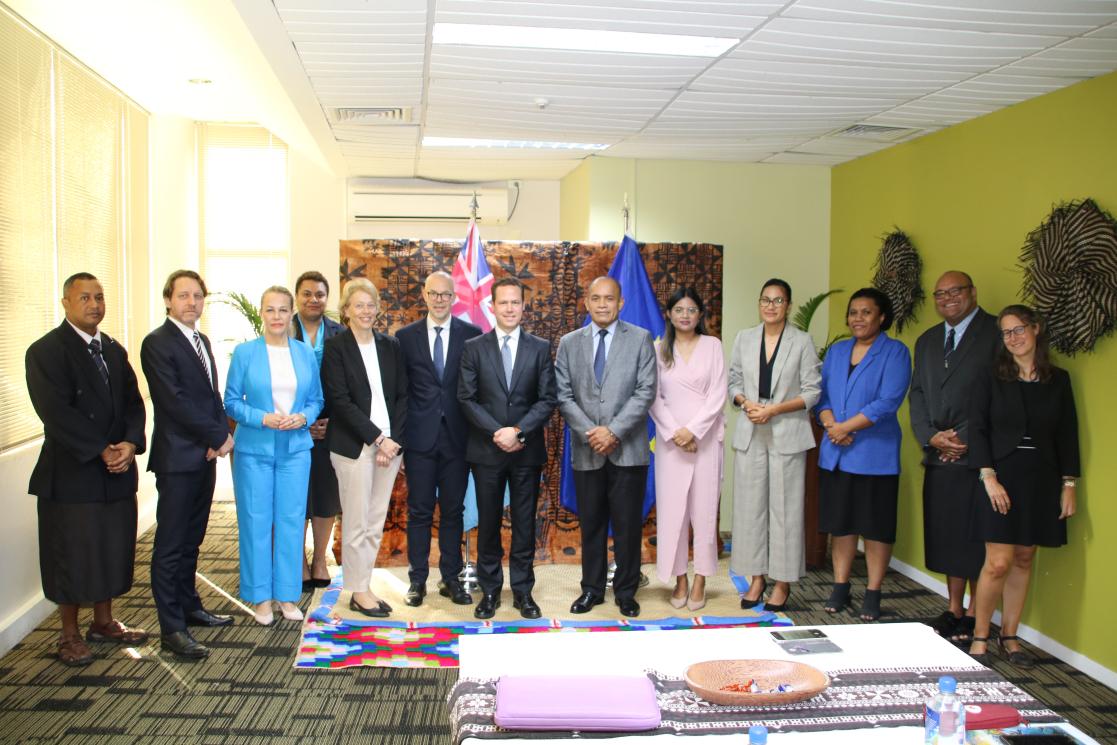Fiji and the European Union - a strong partnership

The EU and Fiji took stock of bilateral cooperation since the last Political Dialogue meeting, held virtually in 2020, and provided updates on key developments. Both parties underlined their firm commitment to the further strengthening of their partnership in upholding the rules-based international order with the UN at its core and ensuring that multilateralism continues to be effective and inclusive. This includes addressing the challenges related to the climate crisis, economic uncertainties, and regional security.
The EU, on the one hand, referred to ongoing work on economic security, addressing the consequences of Russia’s war against Ukraine. On the other, it is fostering an ambitious green and resilient transition within EU and globally. In this context, both sides recognized the importance and urgency of implementing the COP28 Dubai Consensus, cooperate towards COP29, and defining a new post-2025 climate finance goal.

EU Delegation to the Pacific
After the signature of the Samoa Agreement in Apia on 15 November 2023, the EU and Fiji moved to focussing on the implementation of the agreement and it’s Pacific-EU Regional Protocol. The EU and Fiji also discussed development cooperation for 2021- 2027 under the Neighbourhood Development and International Cooperation Instrument (NDICI). The support brought by the EU fully complements the country’s priorities, especially regarding its pledge to become carbon neutral by 2050.
The meeting received updates on the ongoing work on the National Development Plan, Foreign Policy White Paper, and the Ocean of Peace; key projects that inform Fiji’s development and security priorities.
The Partnership Dialogue fully reflected the importance that the EU and Fiji attach to their shared values, including the rule of law, democracy, and human rights. Fiji presented the latest progress it made in the fields of good governance, the fight against corruption, promotion of gender equality, tackling gender-based violence and transnational organised crimes like people trafficking and smuggling of migrants, drug smuggling, and international terrorism. Fiji also provided an update of ongoing ratification of international Human Rights instruments, and the prospect of establishing a fully-fledged National Human Rights institution.

EU Delegation to the Pacific
With regard to trade, the EU and Fiji discussed the potential that the interim Economic Partnership Agreement (iEPA) between the EU and the Pacific States offers for Fiji to increase its trade with the EU. Fiji reaffirmed its commitment to effectively implement and ratify the Agreement. There was discussion on products that are common in Fiji that could be packaged to respond to EU market requirements.
Discussions also focused on the need to make progress on common priorities, in particular on taxation and financial governance and visa arrangement. On ocean governance, the EU and Fiji looked forward to ratification and implementation of the Biodiversity Beyond National Jurisdiction (BBNJ) agreement. Both parties aim to strengthen regional fisheries governance and to combat Illegal, Unreported and Unregulated (IUU) fishing. They also agreed to develop further co-operation in non-traditional security areas such as cyber security and maritime security.
The meeting was co-chaired by Dr Lesikimacuata Korovavala, Permanent Secretary for Fiji’s Ministry of Foreign Affairs and Mr. Niclas Kvarnström, EU Managing Director for Asia and the Pacific, European External Action Service. Also in attendance were representatives from EU Member States including France, Germany and Spain, and the representative of the European Development Bank. The Fiji side was supported by the Office of the Solicitor General, Ministry of Trade and Department of Climate Change.
Background
The Samoa Agreement constitutes the framework for collaboration between the European Union and the African, Caribbean and Pacific States (ACP) in a broad range of areas, including the economy and the environment, peace and security, democracy and political stability and the poverty alleviation. Article 3 of the Samoa Agreement provides for a regular and comprehensive partnership dialogue to exchange information, foster mutual understanding and facilitate the establishment of agreed priorities and shared agendas.
CONTACT DETAILS
For further information, contact Mohammed Nazeem KASIM, EU Press & Information Officer Suva, Fiji Tel: +679 3313-633 Email: Mohammed-Nazeem.KASIM@eeas.europa.eu or delegation-fiji@eeas.europa.eu
